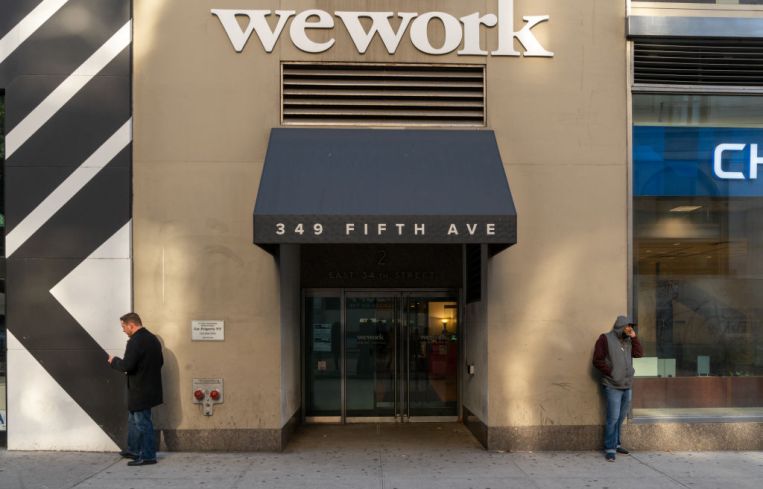WeWork Agrees to Go Public Through $9B SPAC Deal
By Nicholas Rizzi March 26, 2021 10:24 am
reprints
WeWork will try to go public a second time, this time in a deal to merge with a blank-check company that would value WeWork at $9 billion, the company announced Friday.
The coworking giant agreed to merge with special purpose acquisition company (SPAC) BowX Acquisition Corp. in a deal that will provide the money-burning WeWork with a $1.3 billion infusion of cash and make it a publicly listed company, according to WeWork.
“WeWork has spent the past year transforming the business and refocusing its core, while simultaneously managing and innovating through a historic downturn,” Sandeep Mathrani, CEO of WeWork, said in a statement. “As a result, WeWork has emerged as the global leader in flexible space with a value proposition that is stronger than ever. Having Vivek [Ranadivé] and the BowX team will be invaluable to WeWork as we continue to define the future of work.”
BowX — which counts NBA legend Shaquille O’Neal as an adviser — raised $483 million last year to form a SPAC and has been in talks to merge with WeWork since at least January.
As part of the deal, WeWork will also get $800 million in what it calls private placement investment from Insight Partners and funds managed by Starwood Capital Group, Fidelity Management & Research Company and Centaurus Capital, along with funds and accounts managed by BlackRock.
The deal was unanimously approved by both the boards of WeWork and BowX, and is expected to close in the third quarter of this year, according to WeWork. It improves WeWork’s valuation from $2.9 billion last year, but it’s still a far cry from its eye-popping $47 billion valuation in 2019.
Mathrani will remain as CEO and Marcelo Claure will stay on as executive chairman. After the merger closes, BowX’s Ranadivé and Deven Parekh of Insight Partners will join WeWork’s board.
SPACs are becoming more popular among real estate companies as a way to go public, and experts previously told Commercial Observer that the move makes perfect sense for WeWork. It carries far less scrutiny than traditional means of going public and is a much shorter process.
WeWork tried to go public in 2019 through a traditional initial public offering (IPO) process, but faced concerns from potential investors over the amount of cash it burned each year and conflicts of interest from former CEO Adam Neumann.
After a Wall Street Journal profile of Neumann brought to light his erratic behavior — including stashing weed on a private plane to Israel and letting his wife, Rebekah Neumann, fire multiple employees because “she didn’t like their energy” — Neumann stepped down from the company he co-founded.
WeWork canceled the IPO process and eventually named Mathrani, a real estate legend credited with getting mall owner GGP out of one of the largest real estate bankruptcies in history, to turn the ship around.
Under Mathrani, WeWork has shed underperforming locations, renegotiated leases with landlords, laid off employees, sold its Chinese business, and reduced its cash burn.
Last year, WeWork left 106 locations, cut its operating expenses by $1.1 billion, and cut its building operating expenses by $400 million, the company said Friday. It was also able to amend more than 100 leases for rent reductions, deferrals or tenant improvement allowances, which trimmed its future lease payment by an estimated $4 billion.
However, WeWork isn’t out of the woods yet. There’s still a global pandemic keeping the majority of workers out of the office and the company is still losing a ton of money.
Last year, WeWork pulled in $3.2 billion in revenue, but also lost $3.2 billion, a slight improvement from the $3.5 billion it lost in 2019, the Financial Times reported. Occupancy rates at its locations across the world fell to 47 percent at the end of 2020, a decrease from the 72 percent it had at the start of the year, according to FT.
But WeWork and plenty of others think the flexible workspace market is poised for a huge boom in demand once employees start to come back to the office.
Many companies are expected to want to offer workers the ability to have a workspace outside of the home, but without a long commute to the main office, while also retaining employees who may have relocated away from the company’s main headquarters during the pandemic.
“The commercial real estate industry has experienced a seismic shift and the future of work is now being redefined in real-time,” Barry Sternlicht, chairman and CEO of Starwood, said in a statement. “WeWork is the leader in flexible space, with a globally recognized brand.”



